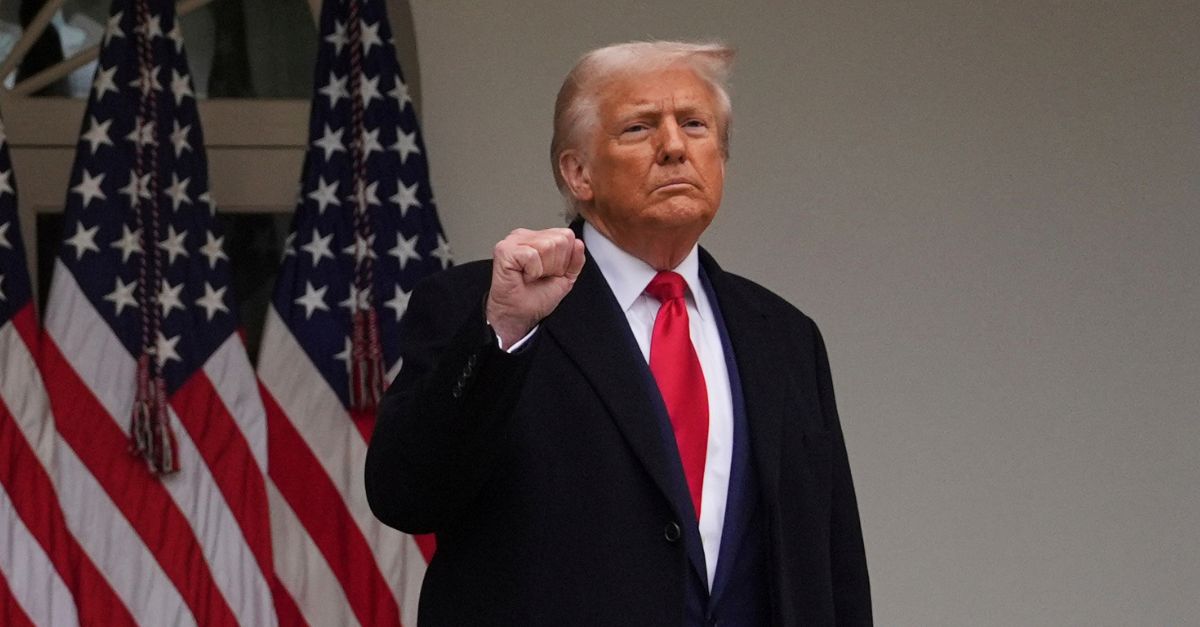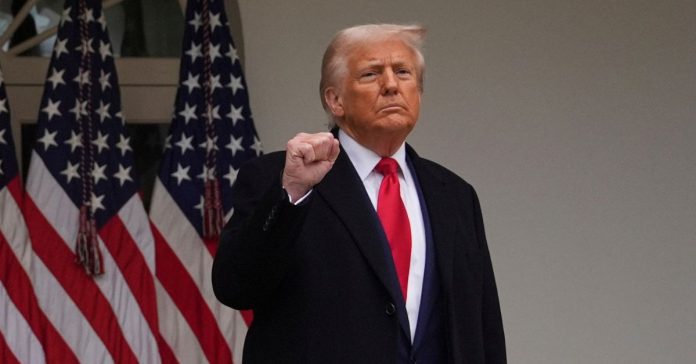
President Donald Trump departs after signing an executive order at an event to announce new tariffs in the Rose Garden of the White House, Wednesday, April 2, 2025, in Washington (AP Photo/Evan Vucci).
The Trump administration is taking yet another legal battle to the U.S. Supreme Court, asking the justices on Tuesday to lift a federal judge’s order that blocked the government from shipping off migrants to countries they have no ties to, claiming it’s “wreaking havoc” on the president’s deportation plans.
“In addition to usurping the Executive’s authority over immigration policy, the injunction disrupts sensitive diplomatic, foreign-policy, and national-security efforts,” wrote Solicitor General D. John Sauer in a 43-page emergency application to the nation’s highest court. “Recent events vividly illustrate the injunction’s pathologies,” Sauer said.
Immigration advocacy groups, including the National Immigration Litigation Alliance and the Northwest Immigrant Rights Project, are suing the Trump administration in a class-action lawsuit over third-country removals.
U.S. District Judge Brian Murphy, a Joe Biden appointee, barred the government from moving forward with the deportations in a sharply worded 48-page memorandum and order on April 18, saying: “This case presents a simple question: before the United States forcibly sends someone to a country other than their country of origin, must that person be told where they are going and be given a chance to tell the United States that they might be killed if sent there?”
The Boston-based judge issued a temporary restraining order on March 28, halting deportations to “third countries” without a judicial review. Murphy issued the order following a motion hearing, during which he upbraided DOJ attorneys for arguing that the deportations “would not be violative of any policy or practice” under U.S. law or treaty obligations. A federal appellate court on May 15 declined to lift it.
Murphy accused the government last week of violating his April 18 injunction by allegedly deporting several migrants to South Sudan, a country from which none of them are from, without due process.
Murphy once again scolded the Trump administration, accusing it of ignoring the “long history” of legal precedent surrounding due process rights by sending at least seven men to South Sudan with less than 24 hours notice.
Lawyers for the DOJ, which has now taken multiple cases to the Supreme Court since Trump took office in January, pushed back on Murphy’s reasoning, saying his order has done more harm than good.
“Having slammed on the brakes while these aliens were literally mid-flight — thus forcing the government to detain them at a military base in Djibouti not designed or equipped to hold such criminals — the court then retroactively ‘clarified’ its injunction to impose an additional set of intrusive and onerous procedures on DHS,” Sauer said Tuesday.
“In addition to being misguided, these court-ordered procedures are unlawful,” he charged.
He said the U.S. is facing a “crisis of illegal immigration, in no small part” because many individuals who are “most deserving of removal” are often the “hardest to remove,” per Sauer.
“When illegal aliens commit crimes in this country, they are typically ordered removed,” Sauer asserted. “But when those crimes are especially heinous, their countries of origin are often unwilling to take them back. As a result, criminal aliens are often allowed to stay in the United States for years on end, victimizing law-abiding Americans in the meantime.”
The Trump administration has “taken steps,” according to Sauer, to resolve this problem by shipping immigrants off to “third countries that have agreed to accept them.” He claims that “until recently, those efforts were working,” but then Murphy’s order came down and allegedly changed everything.
“A single federal district court … has stalled these efforts nationwide,” Sauer said. “On behalf of a nationwide class of aliens with final orders of removal, the district court issued an extraordinary preliminary injunction that restrains DHS from exercising its undisputed statutory authority.”
Under Murphy’s injunction, the government was ordered to “provide written notice” to all immigrants and their attorneys about their proposed deportation destination, among other things.
A “meaningful opportunity” must be provided to express fears that might occur in such countries under the torture convention, the order says, along with an additional chance “to seek to move to reopen immigration proceedings to challenge the potential third-country removal.” An immigrant’s ability to challenge third-country removal must also be granted with a minimum 15-day grace period.
“The district court’s invented process offers little but delay,” Sauer concluded. “While certain aliens may benefit from stalling their removal, the Nation does not.”

